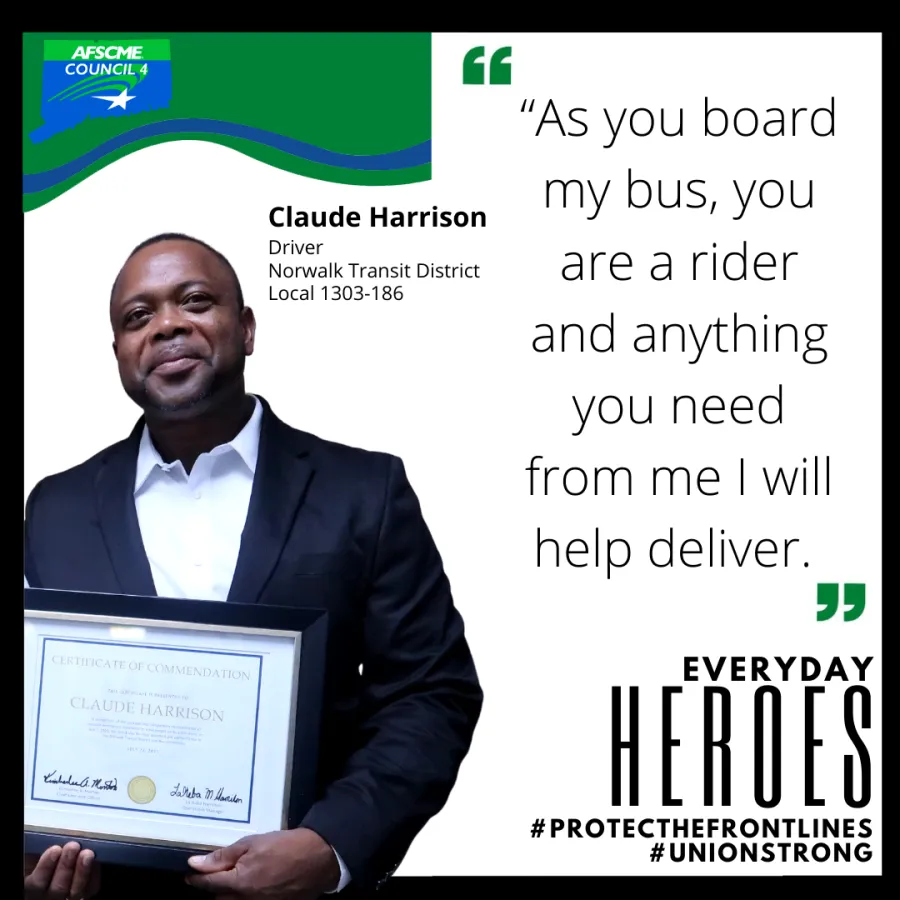Norwalk Bus Driver Goes Above And Beyond Duty to Save A Life

The #4 Norwalk bus driven by Claude Harrison (AFSCME Local 1303-186) has the same daily route which he knows like the back of his hand. But unlike other days in the 11 years he has driven for Norwalk Transit District, one summer shift last year took an unexpected turn.
After departing from a local medical center, a passenger started to yell, “Help me, help me!” He was having another heart attack. Harrison’s acute quick thinking and medical knowledge helped save his life.
When the man disclosed that his chest was tight, Harrison helped him lay flat and tore the front of his shirt open. He began to gently massage the area of the man’s upper lungs and instructed another passenger to do the same to the lower lung area.
“I told him, ‘Relax, you’re ok. Don’t worry, help is on the way,’ Harrison recalled. He said, ‘I’m going to die.’ I said, ‘Not today. Not when I’m here.’ ”
Harrison did a lot more than call emergency personnel and stay with the victim until they arrived. He provided dispatchers the passenger’s name, medications, and pertinent medical issues - all information found from a folder the man carried from his doctor’s visit. He also checked his breathing and pulse and stopped the bleeding from a head wound that resulted from falling to the bus floor in pain.
When the paramedics arrived, they confirmed that the man did have a heart attack. It was Harrison’s tactics they say that provided ample blood circulation to his heart - a key to his survival.
“Lots of times people get very excited during an emergency, but he remained calm,” said Nada Content, a dispatcher for Norwalk Transit who communicated with Harrison during the emergency. “He called the police and EMS to come in and was there for [the stricken rider] until the paramedics came. He saved a life and that is a wonderful thing.”
Although Harrison is extremely humble for his act of heroism and believes any driver could have done what he did, he attributes his experience as a CPR instructor, a family of medical professionals, and the skill of remaining calm throughout the ordeal as factors that aided his bravery.
To Harrison, saving a person’s life is just a part of being a bus driver.
“No matter who you are – whether you are wearing a suit or are dirty or clean – I treat everyone the same,” said Harrison. “As you board my bus, you are a rider and anything you need from me I will help deliver. I don’t think it takes a special person – any driver could have done what I did.”
Harrison has a track record of saving lives. When he was 13 years old, he saved a man twice his size from drowning in a river near his family’s home in Jamaica. He was later scolded by his sister for risking his own life and not considering the family he would leave behind if he also drowned.
“It was a big risk, but you don’t think about it,” he said. “You just grow up like that. I grew up in that kind of community where we always help.”
The town where Harrison lived, Friendship, has a population of 350 people so everyone knows each other. Just next door lies the town of Good Hope. Altruism runs through the DNA of the tight-knit community in which he was raised.
“We don’t call ourselves lifeguards, we call ourselves protectors of what’s there,” Harrison explained. “My sister asked me, ‘Do you think the person [you saved] would speak to you if he saw you walking on the road?’ I said, ‘That’s not important. The word help is what he asked for and what I reacted to. I didn’t care about anything else.’”
Harrison, who came to the U.S. in 1987, understands the importance of his union, not just for the health insurance, worker protection, and other benefits it provides, but because of the power of worker solidarity.
“If you come to this company,” he explains, “where do you think the foundation starts? It’s the workers. It starts from the person who first cleans the bus in the morning. It doesn’t start from the person who gives orders. Without drivers and the buses being clean there is no bus to take people to work, their first job interview, doctors’ appointments, and to see their loved ones.”
Being a worker and interacting with many other workers on any given day is a privilege for Harrison – one that he does not take for granted.
“I feel rewarded every day I help someone,” Harrison reflected. “Seeing working people motivates me and I hope to pass it on to my kids.”
